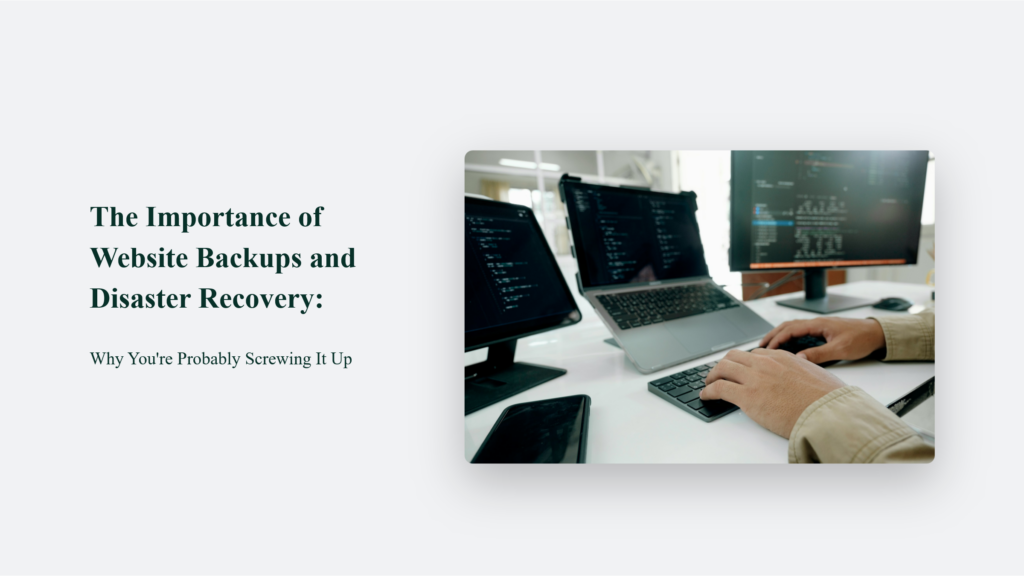Look, I get it. You’re busy running your business, churning out content, optimising your SEO, and trying to stay ahead of the competition. Website backups and disaster recovery? That’s about as exciting as watching paint dry, right? Well, buckle up, buttercup, because I’m about to explain why your cavalier attitude towards this “boring” topic might just be the digital equivalent of jumping out of a plane without a parachute.

The Harsh Reality of Data Loss: It’s Not If, But When
Imagine waking up tomorrow to find your entire online business has vanished overnight. Your website? Gone. Your customer data? Poof. Your meticulously crafted content and years of hard work? Up in digital smoke. Sounds like a nightmare, doesn’t it? Well, for countless businesses, this nightmare is all too real.
Here’s a fun fact to keep you up at night: according to a recent study by Cybersecurity Ventures, a business falls victim to a ransomware attack every 11 seconds. That’s right. In the time it took you to read this paragraph, several businesses had their digital worlds turned upside down.
But surely, that won’t happen to you, right? Your website is probably too small to be a target, or maybe you’ve got that free security plugin that promises to keep the bad guys out. Spoiler alert: you’re wrong, and that complacency is exactly what makes you a perfect target.
Why Your Current Approach Probably Sucks
Let’s be honest for a moment. When was the last time you actually backed up your website? And I don’t mean that your hosting provider does half-arsed automatic backup once in a blue moon. I’m talking about a comprehensive, recent backup that you can confidently restore from if things go south.
If you’re squirming in your seat right now, congratulations – you’re in good company with about 60% of small businesses that don’t have a proper backup strategy. But here’s the kicker: of those businesses that experience a major data loss, 60% shut down within six months. Still, think backups are boring?
The problem is that most of us are hardwired with an “it won’t happen to me” mentality. We see news about massive data breaches at big corporations and think, “Well, I’m not Sony or Facebook, so I’m safe.” Newsflash: hackers don’t discriminate. In fact, they often prefer smaller targets because they’re usually easier to crack.
The True Cost of Neglecting Backups: More Than Just Dollars and Cents
Now, let’s talk about the elephant in the room: money. Because at the end of the day, that’s what this all boils down to, isn’t it? The average cost of downtime for a small business is about $8,500 per hour. Let that sink in for a moment. How many hours could your business survive if your website went dark?
But here’s where it gets really interesting: the financial hit is just the tip of the iceberg. The real killer is the damage to your reputation and the loss of customer trust. In today’s digital age, your website is often the first (and sometimes only) interaction customers have with your brand. If it goes down, you’re not just losing sales – you’re losing credibility.
A study by Salesforce found that 54% of customers don’t trust companies with their personal information. Now imagine explaining to those sceptical customers that you’ve lost all their data because you couldn’t implement proper backups. Good luck rebuilding that trust.
Backup Strategies That Actually Work: Because Not All Backups Are Created Equal
Alright, now that I’ve sufficiently scared the living daylights out of you, let’s talk solutions. Contrary to popular belief, effective backup strategies don’t require a PhD in computer science or a bottomless IT budget.
First things first: understand that there are different types of backups, and they’re not all created equal:
- Full Backups: As the name suggests, these backup everything. They’re comprehensive but time-consuming and storage-heavy.
- Incremental Backups only back up what’s changed since the last backup. They’re quicker and use less storage, but restoration can be more complex.
- Differential Backups: A compromise between full and incremental backups, differential backups back up everything that’s changed since the last full backup.
The key is to find the right mix for your needs. A common strategy is to perform full backups weekly, with daily incremental backups.
Now, let’s address the age-old debate: cloud vs. local backups. Here’s a handy comparison:
The smart move? Use both. Keep local backups for quick access and cloud backups for that extra layer of protection. When it comes to your data, there’s no such thing as being too careful.
Disaster Recovery: Because Backups Are Just the Beginning
Here’s where most people drop the ball: they think having backups is enough. Spoiler alert: it’s not. Disaster recovery is the unsexy cousin of backups that nobody wants to talk about, but it’s just as crucial.
While backups are about saving your data, disaster recovery is about getting your systems back up and running ASAP when shit hits the fan. It’s the difference between having a spare tyre and knowing how to change it in the middle of a rainstorm.
A solid disaster recovery plan includes:
- Clear roles and responsibilities (who does what when disaster strikes)
- Step-by-step recovery procedures
- Regular testing and updates of the plan
- Alternative communication methods (because your usual channels might be down)
- Prioritisation of critical systems and data
Remember, every minute your website is down is money out of your pocket. A well-oiled disaster recovery plan can be the difference between a minor hiccup and a business-ending catastrophe.
Implementing a Bulletproof Backup and Recovery System: Because “Good Enough” Isn’t
Alright, enough theory. Let’s get our hands dirty with some actionable steps to implement a backup and recovery system that doesn’t suck:
- Audit your current setup: What data do you have? Where is it stored? What’s critical and what’s not?
- Choose your backup tools: There are plenty of options out there, from plugins like UpdraftPlus for WordPress to more comprehensive solutions like Acronis or Veeam.
- Set up automated backups: Daily incremental and weekly full backups are a good start. Make sure they’re running smoothly.
- Implement off-site storage: Use cloud services like Amazon S3 or Google Cloud Storage to keep copies of your backups far from your primary systems.
- Test your backups regularly: A backup you can’t restore is worse than no backup at all. Try restoring from your backups at least quarterly.
- Document your disaster recovery process: Write down, step-by-step, how you’d recover if your entire system went down. Then test it.
- Train your team: Everyone should know their role in the backup and recovery process. Don’t be the single point of failure.
- Monitor and update: Set up alerts for backup failures and review your strategy regularly. As your business evolves, so should your backup plan.
The Psychology of Procrastination in Website Security: Why We’re Our Own Worst Enemy
You might be thinking, “This all sounds great, but I’m probably still not going to do it.” And you know what? I get it. Humans are wired for immediate gratification, and the payoff for good backups is all in the future – a future we hope never comes.
But here’s the thing: that same psychological quirk that makes us put off backups is what makes us ignore that weird noise our car is making or put off going to the dentist. And we all know how that usually turns out.
The key to overcoming this mental barrier is to reframe the issue. Don’t think of backups as a chore – think of them as an insurance policy. You wouldn’t drive without car insurance, would you? (If you would, please stop reading this and go sort out your life priorities.)
Future-Proofing Your Website: Because the Only Constant is Change
As we wrap up this little journey through the thrilling world of website backups and disaster recovery (I can feel your excitement from here), let’s talk about the future. Because if there’s one thing we know about technology, it’s that it never stands still.
Emerging trends in website security and backups include:
- AI-powered threat detection: Systems that can predict and prevent attacks before they happen.
- Blockchain-based backups: Decentralised storage that’s virtually impossible to tamper with.
- Automated disaster recovery: Systems that can restore your entire infrastructure with minimal human intervention.
The role of AI and machine learning in disaster recovery is particularly exciting. Imagine a system that can detect threats and automatically isolate affected systems, initiate backups, and begin recovery processes faster than any human could react.
But here’s the catch: none of these fancy new technologies will save you if you don’t have the basics in place now.
In Conclusion: Your Digital Life Preserver
Look, I get it. Website backups and disaster recovery aren’t sexy. They won’t directly boost your SEO or increase your conversion rates. But you know what else isn’t sexy? Watching your business crumble because you couldn’t be bothered to take a few simple precautions.
The digital world is a dangerous place, and it’s only getting more treacherous. Hackers are getting smarter, disasters (both natural and man-made) are becoming more frequent, and our reliance on digital systems is growing by the day.
But here’s the good news: you don’t need to be a tech genius or have a massive IT budget to protect yourself. You just need to care enough to take action. Start small if you have to – set up a simple automated backup system today. Then, bit by bit, build out your disaster recovery plan.
Because at the end of the day, website backups and disaster recovery aren’t just about protecting data – they’re about protecting your business, your reputation, and your peace of mind. And if that’s not worth a little effort, I don’t know what is.
So, what are you waiting for? Go back up your damn website.
Frequently Asked Questions:
How often should I really be backing up my website?
How often do you update your website? If you’re making daily changes, then daily backups are your new best friend. If your site is more static, weekly might cut it. But here’s a pro tip: if you’re asking this question, you’re probably not backing up enough. When in doubt, back it up.
Can’t I just rely on my hosting provider’s backups?
Sure, and I can rely on my neighbour’s garden hose if my house is on fire. Will it help? Maybe. Is it enough? Not by a long shot. Hosting provider backups are a nice safety net, but they’re often infrequent and incomplete. Don’t put all your eggs in that flimsy basket.
What’s the difference between a backup and a disaster recovery plan?
A backup is like having a spare tyre. A disaster recovery plan is knowing how to change that tyre in the middle of a thunderstorm, with a flat jack, while being chased by a pack of dingoes. One is a tool; the other is a complete strategy for survival.




